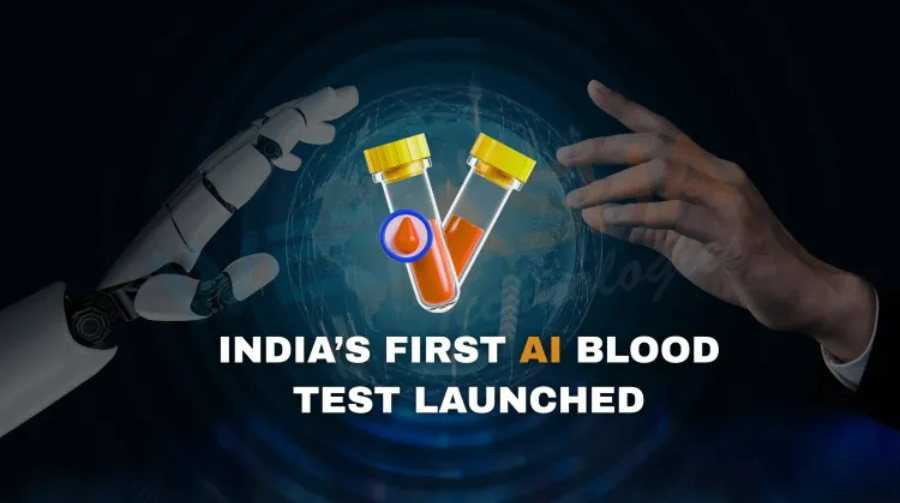Ai
No Needles, No Pain! India Unveils Its First AI-Powered Blood Test with Just a Face Scan
In a world-first for India, scientists and startups have introduced a futuristic blood testing method that completely eliminates the need for needles. You can now get a detailed health check-up by simply looking into a camera — no pain, no fear, no blood.
This new system is designed to make diagnostics quicker, more accessible, and completely non-invasive, marking a major milestone in healthcare technology.

How Does It Work?
The technology combines artificial intelligence (AI), computer vision, and advanced algorithms to analyze your facial features.
Here’s how it works in simple steps:
- You sit in front of a camera and look at it steadily for 30 to 60 seconds.
- The AI scans your facial micro-expressions, blood flow patterns, and subtle skin color changes.
- The system uses huge datasets from previous clinical studies to predict various blood and health markers.
This type of “video-based vital signs monitoring” has been in research globally, but India’s launch is among the first to reach a public pilot stage.
The Science Behind Face-Based Diagnostics
Our skin, especially on the face, reflects a lot of information about our internal health.
- Microvascular changes: Subtle changes in blood vessels under the skin indicate blood circulation quality.
- Skin color variations: Changes in skin tone can signal oxygen levels, anemia, or blood sugar fluctuations.
- Facial thermal patterns: Useful for detecting fever and inflammation markers.
When these are combined with AI’s data-processing power, they can replicate the information you’d normally get from a blood sample.
What Health Markers Can It Detect?
As of now, this AI-based scan can estimate:
- Blood glucose (sugar) levels
- Hemoglobin (anemia risk)
- Oxygen saturation (SpO2)
- Blood pressure and pulse rate
- Cholesterol trends
- Signs of dehydration
Future updates may allow detection of more complex markers like thyroid hormone levels, vitamin deficiencies, and infection indicators.
Who Is Behind This Innovation?
This breakthrough comes from a collaboration between:
- A Bengaluru-based AI health-tech startup
- Top-tier Indian research institutes
- Medical universities specializing in non-invasive diagnostics
The project has been in development for over five years and has involved testing with thousands of patient data points to improve accuracy.
How Accurate and Reliable Is It?
Preliminary studies show high accuracy, with over 85% correlation to traditional blood tests for common markers like glucose and hemoglobin.
However, experts emphasize that it should be used as a screening tool, not a complete replacement for lab blood tests — at least for now.
Impact on India’s Healthcare System
India faces a unique healthcare crisis:
- Huge patient-to-doctor ratio
- Limited diagnostic facilities in rural areas
- High levels of diabetes, hypertension, and heart disease
This new technology could:
- Enable mass community screenings in villages and remote towns
- Reduce the burden on diagnostic labs and hospitals
- Empower people to monitor their health more frequently at home or in local clinics
- Encourage preventive healthcare instead of reactive treatment
Global Potential and Future Use Cases
Globally, non-invasive health monitoring is an emerging trend. Countries like the US, Japan, and China are exploring similar technologies but are still largely in lab stages.
India’s move to pilot it publicly puts the country on the global innovation map and could lead to:
- Partnerships with wearable tech companies
- Integration into smartphones and telehealth apps
- Possible export of this technology to other countries
H2: Expert Opinions and Public Reaction
Expert Views
Medical experts are cautiously optimistic. Dr. Anil Kapoor, a preventive medicine specialist, says: This technology has the potential to transform how we do mass health screening. But it should be regulated and validated continuously
Public Reaction
On social media, excitement is off the charts. Comments like:
- “Finally, no more fear of needles!”
- “I want this in my village clinic!”
- “Technology that truly saves lives.”
The younger generation, who are already comfortable with tech and face recognition, see this as a big win for the future of health monitoring.
Possible Limitations and Challenges
Despite its promise, some challenges remain:
- May not fully replace traditional blood tests for complex diagnostics
- Needs stable lighting and camera quality for accurate readings
- Privacy and data security concerns
- Potential initial high costs for advanced AI systems
The government and developers are working to address these through guidelines and phased rollouts.
What’s Next for Non-Invasive Health Tech?
The future roadmap includes:
- Expanded biomarker detection (vitamin D, thyroid, liver function)
- Home-based devices or mobile app integrations
- AI updates using ongoing data to improve accuracy
- Lowering costs to make it accessible to rural and low-income communities
If successful, India might soon lead the global movement toward completely needle-free, painless, and democratized healthcare.